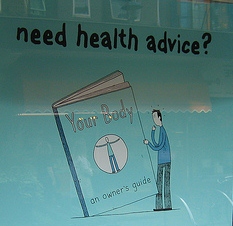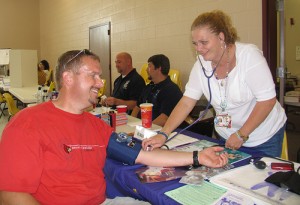by Michelle Sutton-Kerchner
It may take a certain amount of bravado to make an appointment with a physician. A few extra pounds, a questionable cholesterol level, or a worrisome symptom can make the mere idea seem daunting. Ignorance may be bliss. But, guys, it can also be unhealthy …

Admittedly, the stuff of life sometimes gets in the way of our best intentions for health. Sometimes, we don’t even have the initial intention! Our minds are full of work, sport schedules, family obligations, and how to maneuver a fishing trip in there. When, and if, downtime arrives, we don’t envision it in the form of a doctor’s waiting room or a chat about prostate health.
Women aren’t exempt. A recommended mammogram may seem as unlikely as a trip to the spa or an uninterrupted chance to watch the Big Game. Who has time. Or, more significantly, who has the desire. Although, as the gender who carries reproductive responsibilities, specifically child birth and its many beautiful yet physically demanding implications throughout life, women tend to don the exam gown more frequently.
Just the Facts
As a grown man, you appreciate no-nonsense information. With statistics from the United States Department of Health and Human Services’ Agency for Healthcare Research and Quality, you should be dialing your primary healthcare provider right now. (Ah, you don’t have one– excuse number 548.)
- Men are 24 percent less likely than women to have visited a doctor within the past year.
- Men are 22 percent more likely to neglect monitoring of their cholesterol levels.
- Men are more likely to avoid the pneumonia vaccine.
Here are the consequences:
- Men are 28 percent more likely than women to be hospitalized for congestive heart failure.
- Men are 32 percent more likely to be hospitalized for long-term complications associated with diabetes, and more than twice as likely to require amputation of a leg or foot due to diabetic complications.
- Men are 24 percent more likely than women to be hospitalized for pneumonia.
The Rationalization
According to some, nurture tends to affect the male mentality. A 2009 study presented by the American Sociological Association indicated “old-school ideas about masculinity” as the culprit. Raised to believe he must be stoic, fearless, and strong, it takes a truly brave man to admit he needs a tune-up of his own formidable system. If he actually has no concerns (denial?), then why “fix what isn’t broken.” One word: prevention.
A 2007 study investigated 1,100 men for the American Academy of Family Physicians (AAFP). Ninety-two percent revealed that when sick they wait at least several days to see if they feel better before they seek care from a health professional. Nearly 30 percent admitted they wait “as long as possible” before considering a doctor visit. At the time, AAFP President Rick Kellerman, MD, indicated men themselves as one of the biggest obstacles to improving their own health. He concluded, “They don’t make their health a priority.”
You feel smug. “Interesting,” you may be thinking. But (always that “but”): I’m very healthy. I exercise. I watch what I eat. I relieve stress over a beer (my only vice) and my Wii blow-em-away deer hunt game.
Let’s concede to this healthy lifestyle. Despite abs of steel and bulging biceps, we cannot always decipher the body’s true health. Blood levels, cancer screenings, and prevention/early detection measures need to be considered. All of these results may indicate a healthy individual. Congratulations because you now have peace-of-mind and a baseline for future visits. Yes, follow-ups. Living is an ongoing process that requires the occasional check-in with oneself and a physician.
A physician can provide valuable input to enhance your health. This information can propel you on the Exercise Floor and help you make smart decisions in the kitchen or the drive-thru. Share your findings with a personal trainer and the Center’s nurse for a more complete picture of your health. Know where you are, where you are going, and that you’ll have the eye sight to see your way there.
How to Make It Happen
It doesn’t have to be all sports and job woes. Share your health concerns with a buddy as you travel the golf course or stuff your locker. You may find similarities and solutions. Most importantly, a friend can offer encouragement– and reminders– with regards to doctor visits. In the AAFP study, men attributed their decision to see a physician to the influence of a spouse or significant other. Once invoked, don’t be surprised if you suddenly enjoy a closer connection. A friend can motivate you in fitness and other aspects of life.
 You are who you hang around. Attend a lecture on health, nutrition, or fitness. The Center offers community outreach programs, ideal for connecting with experts and obtaining advice outside the florescent lighting of the exam room. Expose yourself to the support of others who may be experiencing the topic presented. Learn more about a specific physician or medical condition. It may be the trigger you need to set an appointment.
You are who you hang around. Attend a lecture on health, nutrition, or fitness. The Center offers community outreach programs, ideal for connecting with experts and obtaining advice outside the florescent lighting of the exam room. Expose yourself to the support of others who may be experiencing the topic presented. Learn more about a specific physician or medical condition. It may be the trigger you need to set an appointment.
Find a reputable physician with whom you feel comfortable. Often, practices allow interviews with their physicians before you entrust him/her with your healthcare needs. The aforementioned advice of sharing with a friend is beneficial here. Recommendations can be the most reliable way to find qualified physicians.
It is not unheard of for a stressed, hurried man to consult the yellow pages when searching for a surgeon. This is a true tale of a man who shall remain nameless to protect his identity. Research the Internet, talk with friends, and consult with healthcare professionals. The phone book may be helpful for a collection of potential candidates. Otherwise, save its use for finding local carpet cleaners.

Get the basics done on-the-go. The Center and other community venues offer health fairs where standard screenings can be performed in a nonthreatening, convenient manner– and without an appointment. Just casually approach the display tables, stick out an arm, and get started in a noncommittal approach. This may be the trick needed to make health your priority. If results come back unremarkable, think of how easy it will be to pump out another set of reps. You’re super healthy. If you need follow-up, nothing gets you there quicker than a questionable screening result.
Top Seven Health Concerns
Major health organizations, including the Centers for Disease Control and Prevention, compiled a list to reflect men’s health risks in the United States.
- Heart Disease: Men’s primary health threat. After motor vehicle accidents, heart disease is the most common killer of men between the ages of 35 and 44 years. In men 45 to 54 years, it’s number one.
- Cancer: Cancers of the lung, skin, prostate, and colorectal cancer are of particular concern. Colorectal cancer is the second leading cause of cancer deaths in men. (Lung cancer is the first.) It’s often preventable with early screening.
- Automotive Accidents: Motor vehicle incidents are the leading cause of fatal accidents among men. Wear a seatbelt. Do not drive while using cell phone functions. Avoid driving after consuming alcohol. Don’t forget the effects of driving while on certain medications or after pulling an all-nighter.
- Chronic Lung Conditions: Exposure to chemicals and pollutants is high in industries that tend to be male dominated (such as auto centers, oil refineries, and construction sites).
- Stroke: Genetics, age, and race are contributing risk factors in this fourth leading cause of death among men. Refuse to let this fate dictate your health. See “Heart Health: Not All Veggies & Aerobics” at https://fitnessandwellnessnews.com/health/heart-health-not-all-veggies-aerobics/. Own your destiny. Know your numbers, including blood pressure and cholesterol.
- Type 2 Diabetes: Learn what truly constitutes a healthy diet and adequate physical activity. You may be surprised at what is considered a healthy portion size. Recognize the accurate definition of obesity.
- Suicide: Sadly, men often deny depression or simply don’t recognize it. Its historical association with weakness produces a stigma hard to overcome. Silent battles may lead to hopelessness and despair. Aside from suicidal risk, depression, anxiety, and other mental disorders need to be accepted. Our mental state is completely entwined with our physical.

Depending on age, health history, and factors unique to you, regular screenings may include: blood pressure, cholesterol, colon and rectal cancer, dental health, diabetes, eye health, prostate cancer, and weight. Put yourself on the yearly plan. Make it a spring thing. Schedule all well-visits and follow-ups throughout a week or two. With a better understanding of your body and healthy living, you’ll probably be cleared now– and in years to come.
Sources
“Health Screening Guidelines,” at www.mayoclinic.com.
“Men’s Health: Preventing the Top 7 Threats,” at www.mayoclinic.com.
“Top Ten Health Threats for Men,” at www.webmd.com.
“When He Won’t Go to See a Doctor … (Here Are Things You Can Do)” at www.prostate.net.
Image Credits
Physician’s office (introductory photo): © Dawn Hudson at www.dreamstime.com
Waiting room: http://www.flickr.com/photos/loopzilla/144038440/
Owner’s manual: http://www.flickr.com/photos/loopzilla/144038440/
Quick check: http://www.flickr.com/photos/glms1/3941996672/
Datebook: http://www.flickr.com/photos/generationbass/4827013488/
 Fitness & Wellness News Your Source for Fitness News, Wellness News, Health News, and Nutrition News!
Fitness & Wellness News Your Source for Fitness News, Wellness News, Health News, and Nutrition News!



